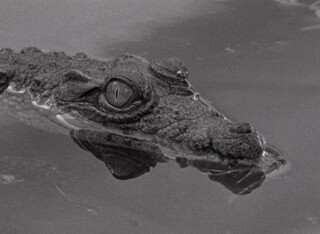At the Berlinale
Jonathan Romney
At many major film festivals, there’s a significant gap between appearance and reality – perhaps nowhere more pronounced than in Berlin. On the surface, this is as showbizzy an event as any. The Berlinale Palast, at the end of a canyon of modernist blocks just off the aggressively soulless Potsdamer Platz, is wedged between a glossy casino and the theatre where, for as long as anyone can remember, the Blue Man Group have been performing the Anglo-German version of their international franchise. For the big official screenings, the festival director, Dieter Kosslick, walks up the red carpet with the visiting talent, dressed in his black coat, scarf and fedora – the uniform of the 1920s actor-manager – and whips up a storm of bonhomie for the TV cameras.
Then the hyperbolic festival trailer begins, plastered with sponsors’ logos (BMW, L’Oréal, Hugo Boss): digital fireworks set to 1990s electro beats and processed guitars that Jean-Michel Jarre might have dismissed as sounding too artificial. And after all this, the film is as often as not a low-key drama about the working conditions of honey-gatherers in Northern Turkey (Honey (Bal)), or the difficulty of caring for ageing parents in Tehran (A Separation), or getting by as a masseuse when you’re sleeping rough in Jakarta Zoo (Postcards from the Zoo).
Not that some of these films don’t prove to be riveting. A Separation, which won the Golden Bear last year, was the first winner for a while to have a significant post-festival life on the art-house circuit. But this year’s competition has proved fairly lacklustre, the sort we’ve been seeing here for too long. Not that it’s easy to get a critical consensus, or even a clear idea of what the festival as a whole is like. On any given day, you can choose from up to 20 press shows from the main sections (Competition, Panorama and Forum), and that’s not taking into account the youth-oriented Generation programmes, the various retrospectives or the Culinary Cinema strand.
In Berlin, you learn not to expect the bombshells that Cannes has made its selling point. There, every film is a potential game-changer, or so you’ve been conditioned to hope. Here, you just pray that the choices will be watchable, though Berlin sometimes manages to come up with, in a small way, an ‘event film’. This year, a buzz of expectation surrounded Brillante Mendoza’s Captive. The Filipino director had a couple of films in Cannes that didn’t quite live up to their provocative premises: Kinotay, for example, was about a police novice enlisted for duty in a death squad. But here he was in Berlin, and working for the first time with an international star, Isabelle Huppert. In fact Captive, about a group of Westerners taken hostage by Islamic militants, proved to be an energetic but uninvolving trudge.
I saw one or two out-and-out duds – films that make you think that Berlinale selections are determined less by quality than by the need to offer a state-of-world-cinema survey. I can’t think of any other reason for programming, say, the ho-hum Spanish genre chiller Dictado, or Lost in Paradise, a sentimental Vietnamese melodrama about rent boys in love – though it’s worth sitting through for the moment when the hard-bitten female streetwalker redeems herself by fighting a vengeful pimp who’s out to kill the duckling (that’s right, the duckling) that’s the only friend of the homeless man with learning difficulties.
But there were redeeming moments. Alain Gomis’s French-Senegalese film Aujourd’hui is a parable about a man (Saul Williams) who must die before the day ends; he walks around Dakar, saying goodbyes, drinking with friends, finally sitting down to relax with his wife. It’s a lyrical, dance-like piece, low on dialogue and at once highly concrete (it makes you think you could find your way around Dakar without a map) and rather abstract. The Wall (Die Wand), based on a novel by Marlen Haushofer, was a solo triumph for Martina Gedeck (from The Lives of Others), who plays a nameless woman mysteriously stranded in the Austrian mountains. It took nine directors of photography to complete Julian Roman Pölsler’s film over several seasons.
Some directors in competition did more or less what they’ve done before, but did it extremely well. Christian Petzold’s Barbara, about a woman’s travails in East Germany in the early 1980s, is a highbrow nail-biter, and a terrific vehicle for Nina Hoss (my bet for Best Actress). Another German director, Hans-Christian Schmid showed in Home for the Weekend (Was bleibt) that there’s still life in the bourgeois family drama, if it’s tackled with delicacy and precision. And Switzerland’s Ursula Meier offered Sister (L’Enfant d’en haut), an unsettling story about a young thief, the Artful Dodger of the ski slopes.
But you always hope a competition will provide one example of what French critics like to call a ‘UFO’, something unexpected and unclassifiable. We got it in Tabu, an oddly sober flight of fancy by Miguel Gomes. It’s a diptych that starts off as the story of a middle-aged woman living in Lisbon, then turns into a Hemingwayesque romance set on the slopes of an African mountain. It’s wonderfully dry and rivetingly unpredictable, and because it’s shot in black and white and is partly silent, there have been mutterings that Tabu could benefit commercially from the huge success of The Artist. The comparison is tenuous – The Artist didn’t have lip-synched Phil Spector covers, or appearances from ‘a sad and melancholic crocodile’. But I’d like to think that distributors would take a risk on Tabu – in grim times, and a snowy Berlin, it’s cheering to see something so outré.
